by Hanna Roberts | Dec 6, 2018 | Academics, Accounting, College Decisions, Current Students, MAcc, Student Spotlights
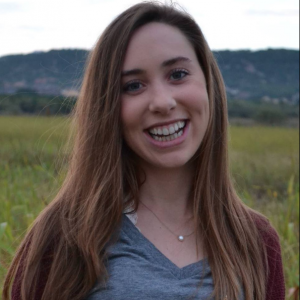
Lexi Koon, graduating senior accounting and major from Denver, Colorado.
Lexi Koon is a senior accounting and management major with a concentration in entrepreneurship from Denver, Colorado. She is in the integrated Masters of Accountancy program and wants to pursue a career as a CPA after graduation. We asked Lexi a few questions about her time at ACU. Read her answers below!
Q: How has your education at ACU, especially in your department, prepared you for the future?
A: My education at ACU has taught me a lot about learning how to see the world from other people’s perspectives and to be a better listener. That applies primarily to my classes outside of my business classes such as my bible classes, my communications classes, and other electives I have had to take over the years. As far as my education in the accounting department, I feel as though I have been prepared by the accounting department to understand the technical skills I will need to further my career as a CPA. It feels really great to come out of four years of school and know that I actually have the skill sets to be successful in a specific field and to also know that I will use what I learned in those classrooms every day in my career. In the business management department, my professors prepared me for my future by exposing me to different aspects of business as a whole, they inspired me to set extraordinary goals and challenged me to dream big (like in entrepreneurship class with Jim Litton), and above all else, they prepared me by showing me they believed in me.
Q: What has been your favorite thing/memory about your time at ACU and COBA?
A: Wow, that is a really hard question. I don’t know if I can necessarily pick a favorite, but it’s more-so a combination of all the times professors tried really hard to make bad jokes in class, when they invited us over for “Grilleniums” or when they invited us to worship events at their church. My most cherished memories have been when professors stopped class to give us a “real talk” about life or when they shared what was going on in their lives to give us encouragement in ours. My favorite experience at ACU by far has been getting to have my professors over and over again in class and building relationships with them to where I know they actually care about their students. From book club with Dr. Laura Phillips to bible study with Dr. Easter, they all have made a huge impact on my life as a student at ACU. The professors at ACU are funny, they are thoughtful, they are kind, and they are beyond caring.
Q: What was your favorite class in the accounting department?
A: Answering this question is difficult because the professors are all so different. All of the professors are great and they all bring a different character to the classroom. Content-wise and professor-wise, I would have to say Income Tax with Dr. Fowler has been my favorite class as an undergraduate. I dreaded having to take that class because, well, who wants to learn about taxes? I found that Dr. Fowler is one of few people in the world who can actually make learning about tax fun. He made us laugh almost every day and he challenged us, but he also believed in us. I’m also currently in his Corporate Tax class in the MAcc program and I can say that may be the hardest class I have ever taken but I still love it because he teaches it and constantly re-affirms us that we can do it.
Q: Who was your favorite professor and why?
A: I spoke a little about Dr. Fowler in that last question, but to answer this question, Dr. Fowler was my favorite professor because he went above and beyond to make us know that we are more than just a number in his class. He is typically known for teaching some of the hardest classes in the accounting department but he is also the professor that sends us emails to tell us he believes in us, that he is proud of us, and that he is here for us. Almost every day in class, he tells us a funny story to make what should be boring content enjoyable, and several times throughout the semester he has stopped class to point out seasons of celebration in our own lives and other times he took the time to be real with where he’s at and the hardships that life faces us all. He made our classes become family and I would go back and take those extremely hard classes again as long as I knew he was teaching it.
Q: If you could talk to a prospective student considering coming to ACU, why would you tell them to choose ACU?
A: I would tell them to choose ACU because it is like no other college they will go to. The “ACU Difference” is the community that you find along the way. This should be apparent in my responses from earlier questions, but the professors, the faculty, and the students have shown me what it is to look at those who are different from me and want to learn from them, to learn how to love them, and to be surrounded by a circle of people who have your back 100%. As I leave ACU, I feel completely supported and surrounded by an extraordinary amount of love and I am thankful. You will never be a number here. The first year is tough at any college, but as you continue to grow your experience here, you will walk around and be known, and that is what the walking in the Kingdom looks like.
by Hanna Roberts | Oct 18, 2018 | Careers In..., COBA Events, Current Students, Uncategorized

Students speak with Jeff Campbell of Southwest Airlines.
You may have heard it said before, but ACU’s College of Business Administration is not your typical business and technology school. Our mission is to educate business and technology students for Christian service and leadership throughout the world. We do this by providing exceptional academics, fostering spiritual growth, and providing students with unique opportunities to interact with professionals during their time here. We work hard to give students exposure to a variety of different businesses that lead to internships and entry0lvel career opportunities.
In October, ten different companies came to campus to speak in classes and lunches, participate in networking events and career fairs, and host on-campus interviews for jobs and internships. Southwest Airlines, Brazen Animation, USAA, Faithlife, KPMG, and PWC are just a few of the companies that come to network and recruit our students through these events. Anna ter Kuile, a senior computer science major from Nashville, Tennessee attended a networking lunch with USAA in the fall of 2017. She had the
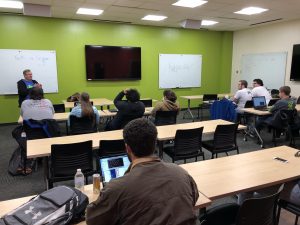
David Mitchell from Faithlife Corporation speaks to a class.
opportunity to meet and connect with employees at USAA and ended up receiving an internship as a software developer and integrator in the summer of 2018. ter Kuilereceived another internship offer from USAA at the end of the summer and plans to work for them again in 2019. “The personal connections I made at the information lunch on campus were invaluable in the hiring and application process,” said ter Kuile. “It gave me an edge over other applicants and I was able to really see the culture of USAA through that event, which made me want to work there even more. Attending that event opened doors for me that I did not know were there and helped me build a foundation for my future career.”
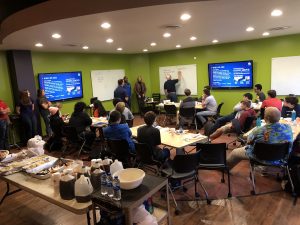
Employees from USAA speak with students at a networking luncheon.
Attending events like these has a wide variety of benefits for students. The most obvious benefit is the potential of internships and jobs that influence careers. These opportunities allow ACU students to get a foot in the door with companies that have competitive hiring. Another benefit is developing the discipline and networking skills necessary in the professional world. Students can practice professional development by not only signing up for the events, where they will network and learn about the professional world, but by being committed, disciplined, and following through by showing up to that event. They can also practice conversation skills and make meaningful contacts with companies.
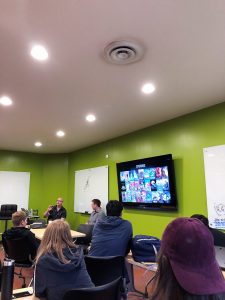
Employees from Brazen Animation speak in a class.
In order to take advantage of these incredible opportunities and events, we advise that students take the time to read their newsletter. Once a week, COBA & SITC send out a newsletter through email that contains everything the student needs to know – special announcements, event promotions, chapel information, giveaways, and more – for the following week. In less than a minute, students can scroll through and see what is going on in the college and sign up for anything they might be interested in. We also promote events on our blog and social media, and monitoring those also helps students to take advantage of special opportunities in our college.
As a student at ACU’s College of Business Administration, we hope you will take advantage of the many professional development resources that are available to you. Be sure to read your newsletter and follow us on social media to stay up to date with the latest in COBA.
by M. C. Jennings | Oct 2, 2018 | Academics, Accounting, COBA Faculty, Current Students, MAcc, Uncategorized
Our last installment in our COBA Study Abroad series highlights the MAcc (Master in Accountancy) trip to Australia and New Zealand, led by Dr. Curtis Clements and Dr. Kyle Tippens. MAcc students received credit for International Accounting and Financial Reporting and International Financial Markets. We can’t think of a better way to learn about global business than being immersed in it! We asked Dr. Clements to tell us what it’s like to learn in the land down under.
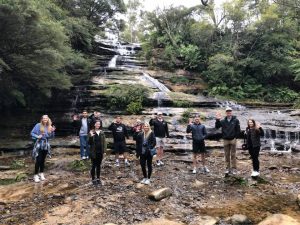
What made your destination a unique place to study?
We didn’t really have a home city. Instead, we traveled to three cities: Sydney and Melbourne in Australia and Auckland in New Zealand. We chose Australia and New Zealand because we had business contacts there and for their diverse cultures.
What businesses were you able to visit?
We visited a number of companies and organizations. These include PWC, KPMG, EY, the Sydney Wool Exchange, The Australian Accounting Standards Board, The Australian Auditing Standards Board, ANZ Bank, Australia-New Zealand Chartered Accountants, and Xerox.

Did you take the students on any sight seeing tours?
In Sydney we went to Taronga Zoo. Taronga is a world-class zoo with many different animals from around the world. We also took a nighttime harbor cruise during the Vivid Sydney festival, which was outstanding. In Melbourne, we took a trip outside the city on a train powered by a steam engine. In New Zealand, we toured Hobbiton where the Lord of the Rings movies were filmed as well as the Hobbit movies. We also went to the Te Puia Maori Village cultural center in Rotorua. On their own, the students also traveled to the Blue Mountains, Manly Beach, and Bondi Beach in Sydney. They attended an Aussie Rules football game, went to Brighton Beach, and watched the penguins come ashore in Melbourne. In New Zealand, the students traveled to several locations outside of Auckland.
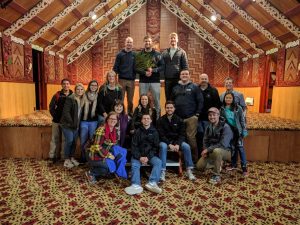
What is it like to be able to spend so much time with students in another country? How does it differ than being in a classroom setting in Abilene?
The experience was outstanding! You get to know the students so well and they get to know you beyond what they see in the classroom. It allows you to speak into their lives on a much deeper level. We learned so much about the students and, hopefully, they know us and our families better.
What were your favorite moments/experiences of the trip?
Two things stood out for me. First, my wife and I were able to renew friendships with people we haven’t seen in 27 years. As far as the academic part of the trip, there are so many things that were enjoyable and informative. I don’t think we had a bad visit and it is really hard to point to one thing. It was interesting as I was reading the students’ journals as they would say, “This is the best thing on the trip!” And then just a day or two later, they would say the same thing! As far as the sightseeing, I would have to say the trip to Hobbiton was the best thing we did.
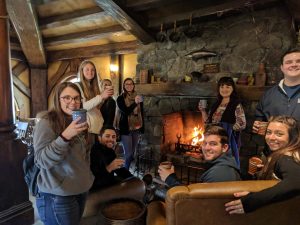
If students could only learn one thing, what do you hope they learned?
That we live in an interconnected world. This is especially true in business. As an aside, I also hope they learned that what we teach and tell them in class really matters!
Anything else I’ve forgotten to mention that you would like to talk about?
We have some outstanding students!
by Hanna Roberts | Oct 1, 2018 | Academics, Current Students, Management, Student Spotlights, Student Spotlights

Trent Warren at Schriever Air Force Base.
Trent Warren is a senior business management major from Colorado Springs, Colorado. This summer, Trent was an intern for Lockheed Martin, a global security and aerospace company. Trent worked as a systems engineer in the Experimentation Lab (X-Lab) at the Missile Defense Agency (MDA). Specifically, Trent worked in control account management, space system engineering, and also participated in the Lockheed Martin summer intern project.
Trent was able to grow professionally this summer because of the variety of projects he worked on and what he learned from his coworkers. He gained experience in finance, programming, and engineering because he was not limited to one type of project. He also knows that working with the brilliant people in the X-lab was key to his growth this summer. Throughout his internship, they guided Trent and challenged him to accomplish difficult but rewarding tasks.
Trent’s favorite part of his internship was working in the X-Lab. He got to work on and solve new and exciting problems. Even though he was there for a short time, Trent feels as if the work he did helped those around him and, more importantly, fulfilled the mission and values of the MDA. Trent’s experience will help launch him into a promising career in systems engineering. He discovered a lot about what it means to be an engineer and how to overcome obstacles in the job. Trent plans to take the lessons he learned this summer with him for the rest of his life.
Reflecting on his internship, Trent has three pieces of advice for future interns:
1. Push through your blockers. Whenever you get stuck on something, or whenever a task just seems too difficult to accomplish, keep attacking it from every conceivable angle. There are plenty of people that can do most of the work on a job. What makes you stand out is if you can use your resources to finish a job that no one else can figure out.
2. Write. Down. Everything. Every business has their acronyms and lingo. If you do not understand what something means in a meeting or in a conversation, write it down and ask someone later. Knowledge is power, and the first step to knowledge is writing down what you don’t know (which is usually almost everything at first).
3. Work hard for the right reason. In every business, there are people who are just working for the next promotion. Personally, I work for the people around me, for the mission of the organization, and for my God. Pick what you work for because that philosophy affects every decision you make.
by M. C. Jennings | Sep 14, 2018 | Academics, COBA Faculty, Current Students, Faith Infusion, Social Entrepreneurship, Student Spotlights, Uncategorized
COBA professors and students were world travelers this summer, as we have covered in parts 1 and 2 of our blog series on our study abroad trips. This July, professors Laura and Mark Phillips took students to Central America where they received course credit in MGMT 419 (Global Entrepreneurship) and MGMT 340 (Fundamentals of Life Design). We asked Dr. Laura Phillips to tell us about their experience. We hope you enjoy the third installment of our four part blog series on the 2018 travels of the COBA Study Abroad program.
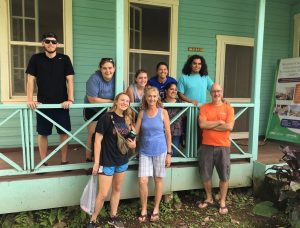
What made Central America a unique place to study?
Central America is a unique place to study Global Entrepreneurship because while the culture, laws, and economic environment are different from the United States, Central America is a place with lots of start-up businesses. Also, the people are very hospitable which makes visiting start-ups easier. In addition, Central America is small geographically but the different countries are unique. Some of the challenges of starting a business in Costa Rica are different from the challenges of starting a business in Honduras. Finally, we were able to see first hand how the government can drastically alter the business environment; the recent unrest in Nicaragua is an unfortunate example of the instability inherent in emerging economies.
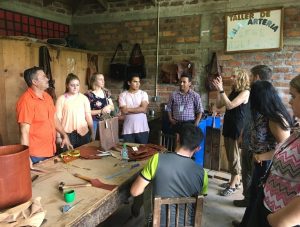
What businesses were you able to visit?
I’m not even sure where to start here. I guess I’ll just make a list.
San Jose, Costa Rica
- Yuxta Energy–solar energy
- e.e.d.–legal services for social ventures
- VivaIdea–a think tank for increasing the impact of entrepreneurship in Latin America
Guanacaste region
- Vida Adventura–adventure camp
- Hotel Las Tortugas–small private hotel in Playa Grande
- Taco Star–taco shop on the beach
Sarapiqui region
- Chilamate Rainforest Eco Retreat
Turrialba region
- CATIE University and the Sustainability House
- butterfly farm
- dairy/cheese making business
- beneficial plants business (medicinal, herbs, etc.)
- pueblo tourism business
Honduras
- Mission Lazarus–here we also
- made organic fertilizer
- conducted a half day training session for the students and teachers at the vocational schools on basic business topics
- hardware store
- bootmaker
- trash collector/recycler
- restaurant owner
- coffee farm/barber shop/tienda owner
For the most part we visited with the entrepreneur (or an employee for the larger organizations) to learn about what they do, what the biggest challenges are, how/if they plan to grow, etc.
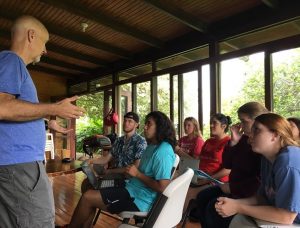
Did you take the students on any sight seeing tours?
- Walking tour of San Jose
- Ziplining at Vida Adventura
- Horseback riding at Vida Adventura
- Surfing lessons at Playa Grande or
- Canoeing on the estuary at Playa Grande
- Birdfinding nature walk
- Hike to waterfall and swimming
- Cultural scavenger hunt (milking cows, Latin dancing, making tortillas, etc.
- Archaeological tour
The students enjoyed the sightseeing activities. They were a lot of fun.
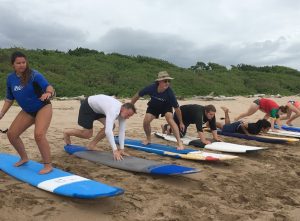
What is it like to be able to spend so much time with students in another country? How does it differ than being in a classroom setting in Abilene?
This particular study abroad is different from going to Oxford or Leipzig because we really are all together most of the time. There were even a couple of places where we stayed in one big house. It’s very different because in Abilene you are with your students in class and then they do their own thing the rest of the time. On this study abroad we usually eat together, we travel together, we spend much of our free time together, plus we have class together. You really get to know each other and, as the students said, you become more like family.
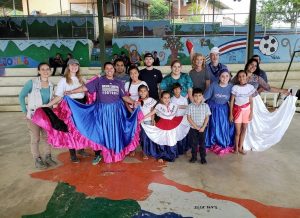
What were your favorite moments/experiences of the trip?
Well, I love the fact that we are outside so much and that even when you are “inside” you are usually outside. In many ways life is harder but in many ways it’s simpler. The pace of life is slower and the people put more emphasis on relationships than on to-do lists. Most of our students found the Latin pace therapeutic. There were many great experiences but one of my favorites was going in the butterfly house. The house was full of flowers and the butterflies seemed like flying flowers. It was beautiful.
I also loved watching our students conduct the business training for the people at Mission Lazarus. That activity was a real challenge and stretch for our students, especially since we were having to work through a translator. They students rose to the challenge and did a fantastic job!
If students could only learn one thing, what do you hope they learned?
I would want our students to learn that people are people everywhere; we are more similar than we are different. I would want them to learn that there are business opportunities everywhere but that to be successful you MUST know the culture and context of the place in which you are operating. I would want them to know that the fast-paced, individualistic, climb to the top American business style is not the only way to live. I would want them to know that being happy and being successful are not directly tied to a salary amount or prestige. (So…that’s four things, but they are kind of related.)
by M. C. Jennings | Aug 20, 2018 | Academics, COBA Faculty, Current Students, Faith Infusion, Uncategorized
This July, the COBA classroom moved around the world to Leipzig, Germany with professors Don Pope and Dennis Marquardt leading the way. Students received course credit in Cross Cultural Organizational Behavior and Global Operations Management. We asked Dr. Pope to tell us an overview of their trip. We hope you enjoy the second installment of our four part blog series on the 2018 travels of the COBA Study Abroad program.
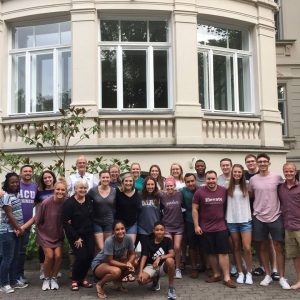
The group poses in front of their home away from home in Leipzig
What made Leipzig a unique place to study?
Leipzig is a mid-sized German city with a long and proud history. It is not a tourist destination. You would have to search for a souvenir shop. It is historically important because it was the home of Bach, among other well known German musicians and writers. Martin Luther lived in the nearby town of Wittenberg. Leipzig was the center of the ‘quiet revolution’ uprising that brought down the iron curtain in 1989. The German language adds a dimension to a study abroad experience that an English-speaking location cannot provide. But, enough English is spoken to allow one to get around without great difficulty.
Were you able to visit any companies or work on projects with companies in other countries?
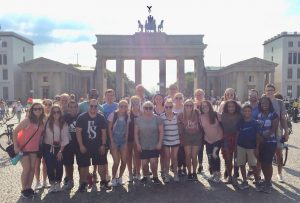
At the Brandenburg Gate in Berlin
We toured the BMW assembly plant in Leipzig which is very modern, is automated, and operated with great German efficiency and attention to sustainability.
Did you take the students on any sight seeing tours?
We took the students to visit Wittenberg where Martin Luther nailed his statement of protest to the church door 501 years ago, at great personal risk to his life. We also did a group tour of Berlin and many of the sites there, including the Berlin wall and memorial museum for Jews who lost their lives in the Holocaust. We traveled to Weimar and the nearby site of the World War II Nazi concentration camp, Buchenwald. We saw a place of great horrors and felt the weight of the suffering that occurred there. We saw the 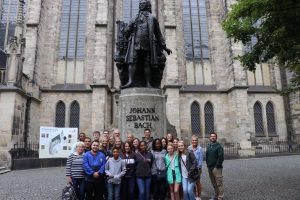 ovens that burned the bodies of those killed, the hooks on the walls where people were hung, the shoes of the victims, many of them children. We saw the memorial to the living – those who survived. The memorial plaque is simple in design, and heated to a living temperature of 98.6 all through the cold winters.
ovens that burned the bodies of those killed, the hooks on the walls where people were hung, the shoes of the victims, many of them children. We saw the memorial to the living – those who survived. The memorial plaque is simple in design, and heated to a living temperature of 98.6 all through the cold winters.
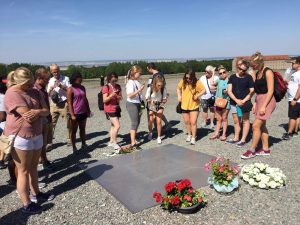
Visiting the Buchenwald Concentration Camp Memorial
What is it like to be able to spend so much time with students in another country? How does it differ than being in a classroom setting in Abilene?
Spending time in other countries helps to open your mind, eyes and heart to the world and appreciate the lesson that God tried to each Jonah long ago – that He loves and cares for all people everywhere.
What were your favorite moments/experiences of the trip? 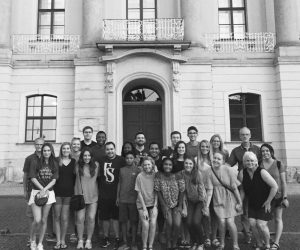
The trips mentioned above, and getting to hang out with the students and get to know them better.
If students could only learn one thing, what do you hope they learned?
That the world is a much bigger place than the little bubble that most of us live in, and that we need to learn to live and function in a global community.

















 ovens that burned the bodies of those killed, the hooks on the walls where people were hung, the shoes of the victims, many of them children. We saw the memorial to the living – those who survived. The memorial plaque is simple in design, and heated to a living temperature of 98.6 all through the cold winters.
ovens that burned the bodies of those killed, the hooks on the walls where people were hung, the shoes of the victims, many of them children. We saw the memorial to the living – those who survived. The memorial plaque is simple in design, and heated to a living temperature of 98.6 all through the cold winters.
